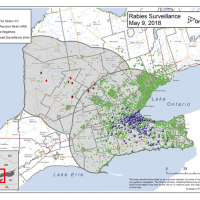Despite a lot of efforts to limit the spread, Rabies remains to be very active in Ontario.
Since December 2015, there have been 400 cases of raccoon rabies in Hamilton and surrounding areas. The affected animals were raccoons and skunks, but also two cats, one red fox and one llama. Rabies is slowly spread by infected animals and 17 cases of fox rabies have been confirmed in Perth, Huron and Waterloo counties, including six bovines, 10 skunks and one red fox. This disease is steadily increasing. See http://unionvet.ca/2017/06/09/state-of-raccoon-rabies-in-ontario/
Veterinarians should always be the first point of contact for animal owners with concerns about their animals’ health, including potential rabies exposures. Veterinarians will contact the local health unit and start the legally required reporting process.

Rabies surveillance and control May 2018
The OMAFRA rabies website includes information about rabies response in Ontario. It has a section for owners and a more detailed section for veterinarians, including a rabies response training module and risk assessment flowchart. OMAFRA also posts the latest surveillance maps from the Ministry of Natural Resources and Forestry as they are released.
Currently there have been no cases of Rabies reported by veterinary clinics in Markham, but a look at the map shows that we are not very far from the epicenter of the outbreak.
Veterinarians and pet owners need to remain vigilant for cases of domestic animal exposure to potentially rabid animals. Rabies vaccination for dogs and cats is a regulatory requirement in most health units in the province. This applies to indoor animals and animals who go outside. Many cat owners believe their indoor cat does not need rabies vaccination, but this is incorrect. Vaccination requirements are being updated July 1, 2018 — for details, contact the Ontario Ministry of Health and Long Term Care. If you suspect a domestic animal may have recently been exposed to a potentially rabid animal, it should be vaccinated (or revaccinated) as soon as possible if it isn’t possible to have the offending animal tested.
Who to call in cases of potential rabies exposure:
1. Human exposure to a potentially rabid animal → Report the incident to York Region Community and Health Services Department as soon as possible, call Health Connection 1-800-361-5653 (TTY 1-866-252-9933) and speak to a Public Health Inspector.
2. Domestic animal exposure to a potentially rabid animal, NO human exposure → Call your Markham veterinarian
- Animal owners should contact their local veterinarian as the first step for any animal health concerns.
- Veterinarians can refer to the online training materials or call the OMAFRA Agricultural Information Contact Centre: 1-877-424-1300 for assistance.
3. Abnormal wildlife, NO domestic animal exposure, NO human exposure → MNRF or Canadian Wildlife Health Cooperative (CWHC)
- For assistance with a live animal, contact a local animal/wildlife control agency first.
- For terrestrial wildlife, once dead or confined, call the MNRF Rabies Hotline: 1.888.574.6656.
- If a sick or injured bat is found, consider contacting the CWHC at 1.866.673.4781.
If you found this blog informative, please share it with your friends on Facebook . Please call us (905)477-2323 for any questions or search for more articles on our website: http://unionvet.ca/resources/client-education/
Sincerely,
Dr. Ernst Marsig, veterinarian in Markham
Fear Free Certified Practitioner
Practicing Veterinary Medicine in Markham for a Long and Happy Life of ALL Your Pets.
Animal Hospital of Unionville, a veterinary clinic on the north side of Hwy 7, serving all pets in Markham, Richmond Hill, Scarborough, Stouffville, and North York since 1966. We are your family vets for dogs, cats, pocket pets (rabbits, chinchillas, gerbils, mice, rats, hamsters, guinea pigs, skinny pigs, etc.), ferrets, and birds (budgies, cockatiel, parrots, amazon, cockatoo, love birds, conures, African greys, finches, canaries, etc.). We pride ourselves to provide cost effective veterinary medicine and give you options for treatments. Some may think our services as cheap, but our goal is to give good value.
Disclaimer: No part of this website constitutes medical advice. Readers are advised to consult with their veterinarian.

